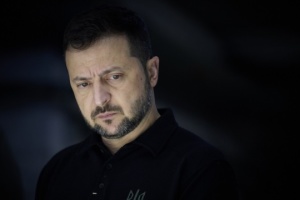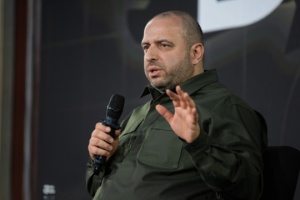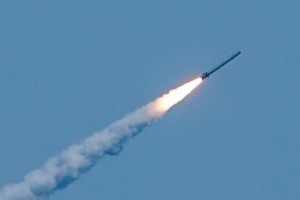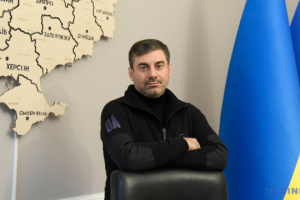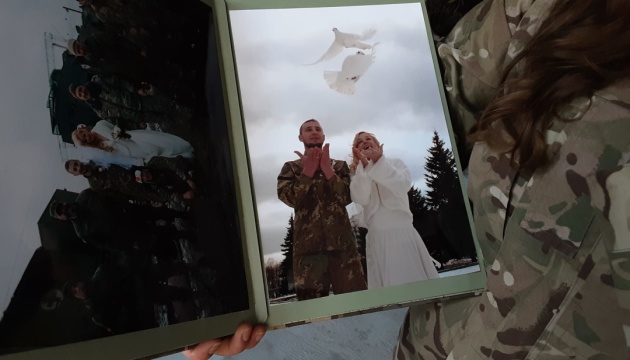
Letter to coffin, or story of front-line love
They are both Maidan activists. However, they met after the Revolution of Dignity, when they stood up to defend Ukraine, as soon as the first tanks entered the Donetsk region. At the time, Olena Kutova served as a military medic in the 10th Mountain Assault Brigade, and Vadym was in the Donbas Battalion. They got married right at the front and dreamed of building their home together in a free Ukraine. But the war did not spare their happiness. In March 2023, Vadym was killed in the battle for Bakhmut. The hero's wife recently donated his belongings to the Heavenly Hundred Museum.
We meet Olena Kutova at the same museum in Ivano-Frankivsk. The woman admits that after Vadym's death, at the age of 37, she turned completely gray.
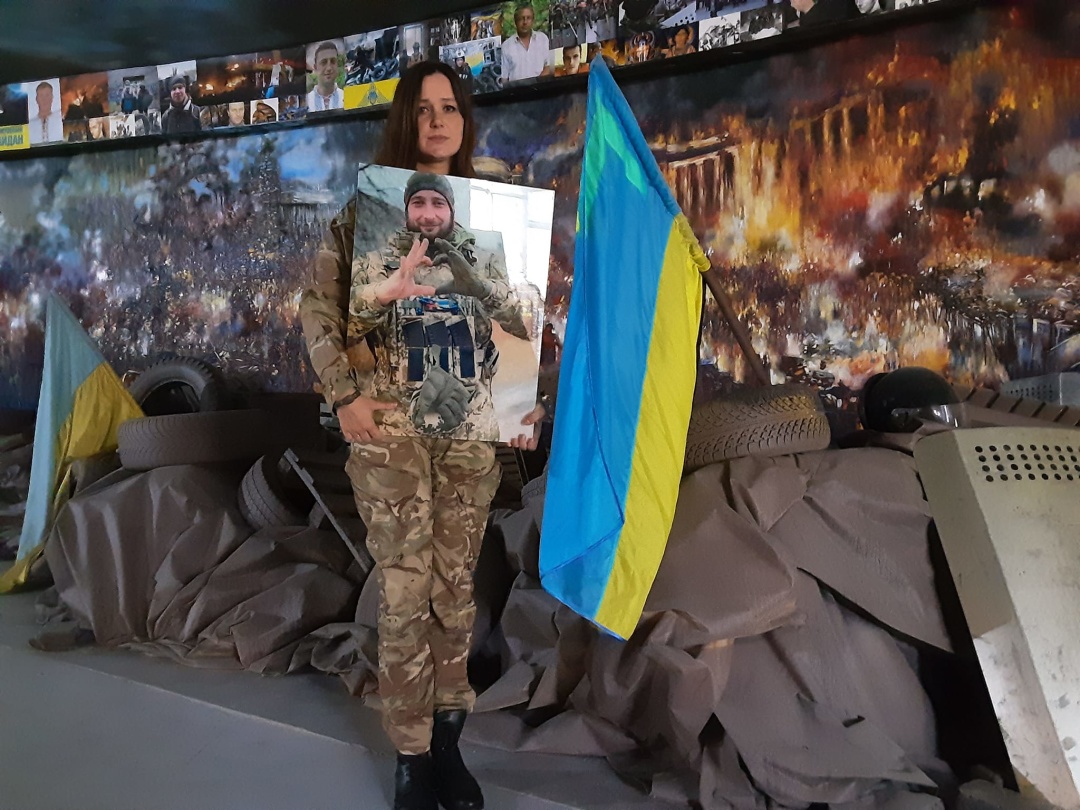
TO THE MAIDAN - FROM A PEACEFUL LIFE
Olena traveled to the Maidan from Ivano-Frankivsk by bus in February 2014. She says her fighting spirit and desire to fight for a free Ukraine were so clear and conscious that no one could stop her. Her mother and two young children remained at home, and Olena did everything she could on the Maidan, but first and foremost, she helped the wounded.
"Bandages and injections were not difficult for me, even without a medical degree. My mother, aunt and the rest of my family were doctors, and I worked as a nurse in a hospital during my school years, taking care of my sick grandmother. So I had the skills," Olena recalls.
At the time, Vadym was also on the Maidan. He is from Cherkasy region. He and his two brothers were raised by their grandmother alone. In Kyiv, Vadym was among the activists and students of the Maidan during its most difficult days. He would later say that the shootings on February 20 were a turning point for him in choosing his own future. So, almost immediately after the Maidan, Vadym left for the ATO zone.
After returning to Ivano-Frankivsk, Olena also planned her future. She admits that she considered all the possibilities to get a medical degree. But she was asked to help in a hot spot that had just appeared on the map of Ukraine. And Olena did not refuse.
"As soon as the tanks started rolling into Mariupol, I went to Donetsk region with my friends. I was told that I could help both the Ukrainian military and the locals there. I remember that among the first cases was a pregnant woman who was found with her hands tied in a well... The situation there was very dangerous at the time, although there were no serious injuries such as amputations. In Desna, I was enrolled in the training of the first medical company, and in 2015, my official service began," says Olena.
She recalls that the selection process for the medical company was tough. But Olena passed it brilliantly. She easily navigated the terrain, quickly made decisions about assistance and had excellent medical skills - she could instantly find a vein for injections, count a pulse, skillfully make bandages and never get lost under any circumstances. She says the training lasted more than 4 months. It was hard both day and night.
"A lot of people were desperate and afraid when it came to severed limbs and blown up bodies... We had to look around us every second, and we had to react instantly because it saved people's lives. We were being trained for real combat there," she says.
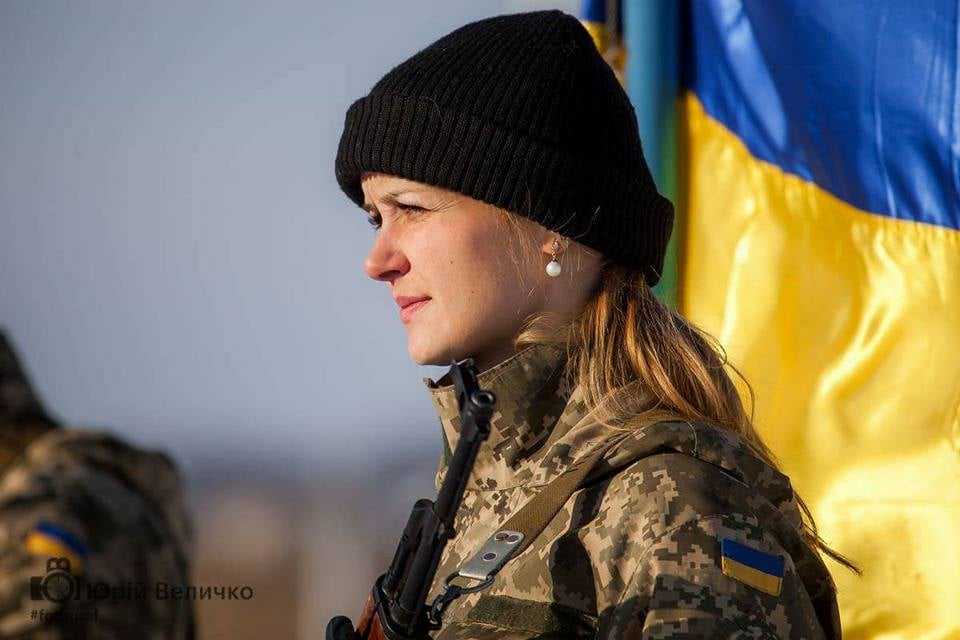
I OFTEN SEE THE EYES OF THE DEAD
Olena entered the anti-terrorist operation zone as part of the 10th Mountain Assault Brigade. She recalls that when the vehicles with the military accidentally turned into a residential area near Yelyzavetivka, people greeted them with incredible joy.
"I remember a local woman saw us and started crying. People were happy to see the Armed Forces of Ukraine, they said: "Ours have arrived". Several people knelt down and greeted us with flowers," Olena recalls.
Difficult battles were going on in Krasnohorivka at the time. From there, even without special equipment, it was possible to observe the occupiers walking through the local mines. Olena would go on missions with snipers for several days. Later she was transferred to the Donbas battalion.
"It was scary. Already in Bakhmut, Katerynivka, the trenches resembled pictures of the Second World War. The guys there called me 'sister' and even 'mom'. In critical moments, they held my hands and begged for rescue... Many of them had to be taken away from the battlefield. How many were rescued? I do not remember. I only remember the dead. I often see their eyes. Right in front of me, or in my dreams, I see the eyes of all those who died. It is very hard," Olena admits.
She remembers having to take the wounded from the battlefield during shelling.
"I remember the armor was hanging in the car right next to the driver's window so that they wouldn't kill me before we got there. We were driving there with the headlights off. There are mines and landmines there. You crawl there, covering yourself with something to take the wounded. Then the car was racing at such a speed that the rally was resting. We tried to save everyone we could," Olena recalls.
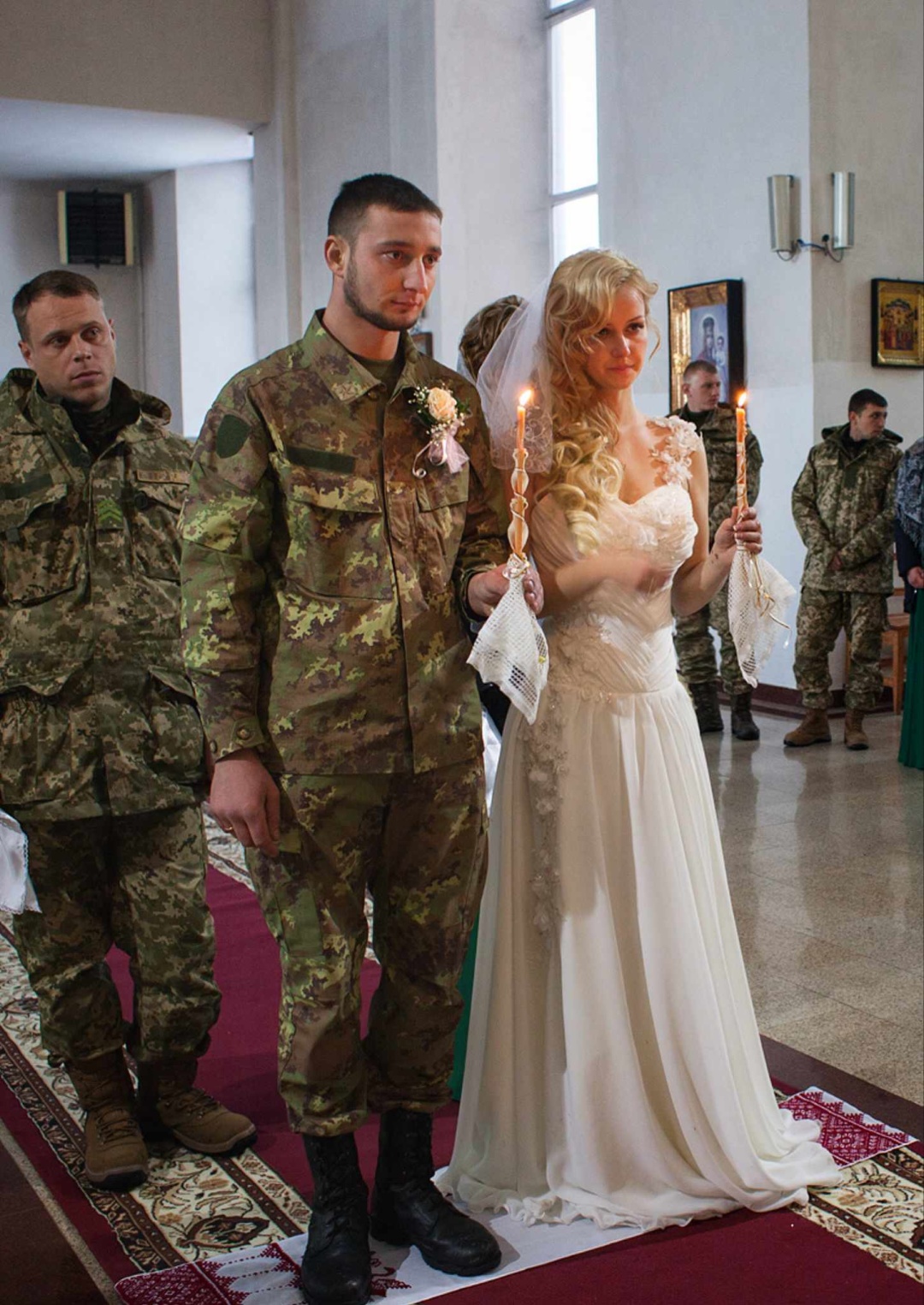
WEDDING IN CAMOUFLAGE AND A WHITE DRESS
It was in the ATO zone when she met her Vadym. He was then an anti-tank defense operator with the Donbas battalion. Vadym had already been through Ilovaisk, Pisky, Shchastia, and the Svitlodarsk bulge.
"We met in a tent where I was waiting for a medical vehicle to deliver medicines. They were preparing to deploy a medical unit there. Vadym came in by chance and asked for coffee. I offered him to take care of himself - I showed him where the kettle and water were... Later he came by with candy several times. And then he asked if I had a boyfriend. I said, "What boyfriends? There are fighters here and I don't have time for that. I didn't plan any relationship at all, because I came to the front, not to have fun," the soldier says.
At first, they exchanged glances when they met, stopping for short conversations. But in a military hospital, Vadym did not recognize Olena when he saw her. Later, the woman learned that Vadym had his seventh concussion and it was much more severe than hers.
Three months later, Vadym asked Olena to marry him. She refused at first, but he persisted.
"He was very wise for his age, he seemed to be not 27 years old, but all 50. I told him about the two children at home, to whom I sent goodies on occasion during the war. You know, to walk about 7 km to the post office, I would take a few grenades in my backpack just in case, get to the post office, where I would redirect the parcel so that my family would not know where the parcel came from... I suggested that if he had a great love, he should wait until the war was over, think about it, and get to know me. But he behaved like a grown man - he bought rings and arranged a wedding in the church. I agreed because he was a hero to me. The one who always goes ahead with a blue and yellow flag. He was often called a Nazi because it was important for him to destroy the separatists in his Ukraine and he did it courageously, without a drop of fear," Olena says.
When the commander learned about his soldiers' plans, he gave an order to "organize a wedding in a human way." They got married in Lozova. However, the day before the wedding, the battalion was ordered to go to the ATO zone.
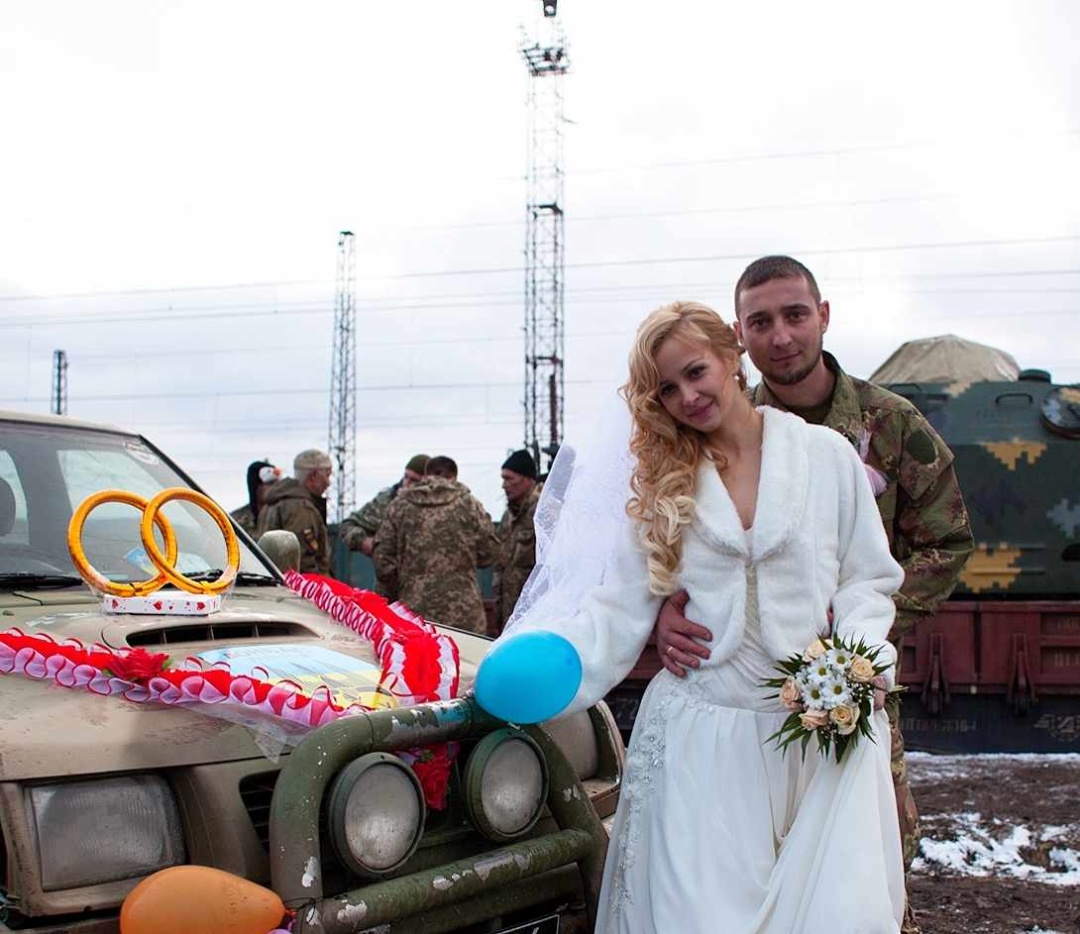
"It turned out that some people stayed behind. There was no command, about 20 soldiers were our guests. We even had a photographer - Yuriy Velychko from the Donbas battalion, with the same call sign as 'Photographer'. Now I wish we had more photos of us together, except for our wedding photos. Back then it seemed like we had our whole lives ahead of us. Yes, I wore a white dress at the wedding. I didn't choose it from a catalog or in a store. The woman who sold it only promised that I would receive the dress on time. Surprisingly, it fit me perfectly. It was as if it had been made for me, and I was happy," Olena admits.
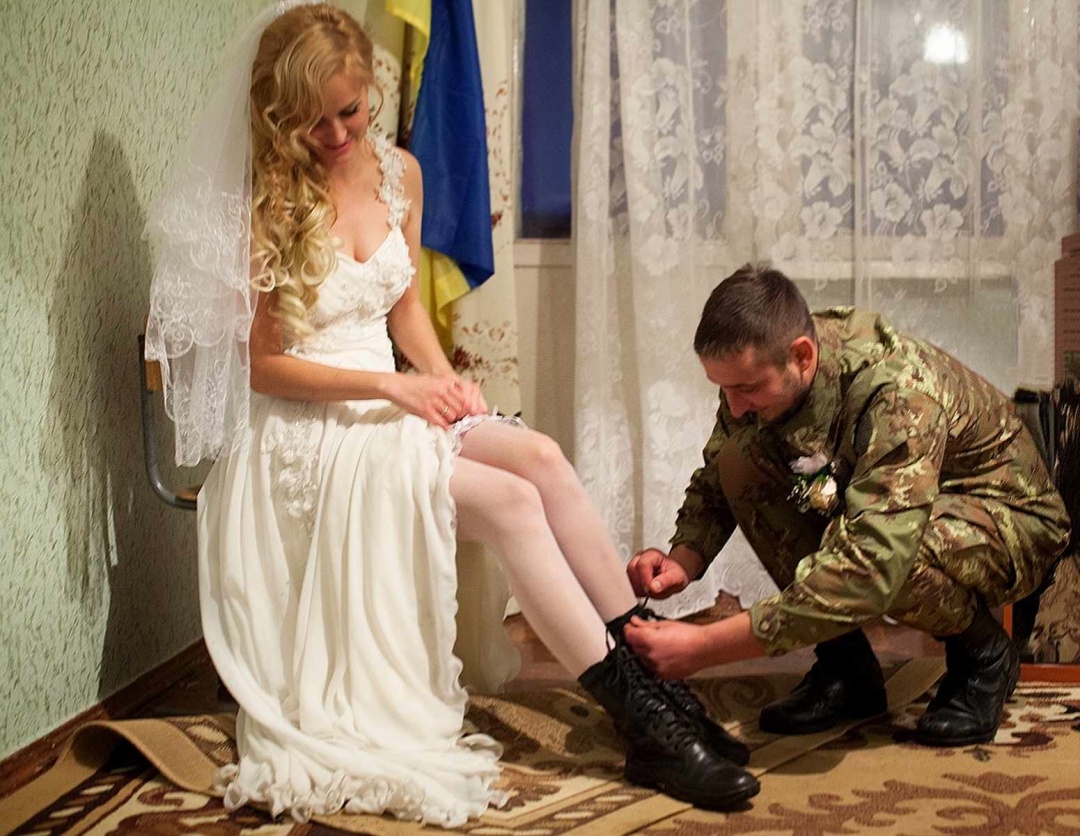
VADIM WAS A VERY GOOD DAD
The very next day after the wedding, the newlyweds were going to the shooting range. Olena managed to pack her wedding dress and wedding icons to mail them home.
"We didn't even cut the wedding cake because everyone was so tired. We only had enough energy for a few dances when we took off the veil. We sent everything left on the table to our guys in the ATO," Olena recalls.
A few weeks later, the young wife felt she was in labor.
"It was winter. The sun was blinding in my eyes, and I was standing with the Ukrainian flag during the oath of office for new recruits. There are many people around me with cameras and video cameras, and I feel weak. I remember asking to be replaced and fainted a few minutes later," Kutova admits.
A pregnancy test confirmed all her guesses. Her husband was in the hospital at the time, and the news was incredibly comforting. However, despite all his hopes that his wife would leave the combat zone, Olena stayed with Vadym for more than six months at the front.
"When I was seven months pregnant, I received a certificate of unfitness for service and waited another month for my vacation. My husband's contract ended and we went to Frankivsk together. My mother was very surprised because she didn't know I was at war, I told her I was studying in Kyiv," Olena smiles.
Anastasiia was born in Ivano-Frankivsk, and the young family with three daughters was getting used to a new life in a peaceful city.
"Vadym was a very good father. Maybe because he grew up without parents, did not know childhood... I remember he always swaddled the youngest, walked with her. Nastia was his universe," the woman recalls.
Everything seemed to be going well - the girls were growing up, Vadym found a job. But after February 24, the anxiety never left anyone. Olena sent her children to Poland with her sister, and she started volunteering. Vadym joined the Territorial Defense Forces (TDF). Sometimes he sent his entire salary to his comrades at the front and continued to pound the doorsteps of the military registration and enlistment office. They asked him to restore his documents. Olena understood that her husband was already mentally at war and nothing and no one would keep him at home.
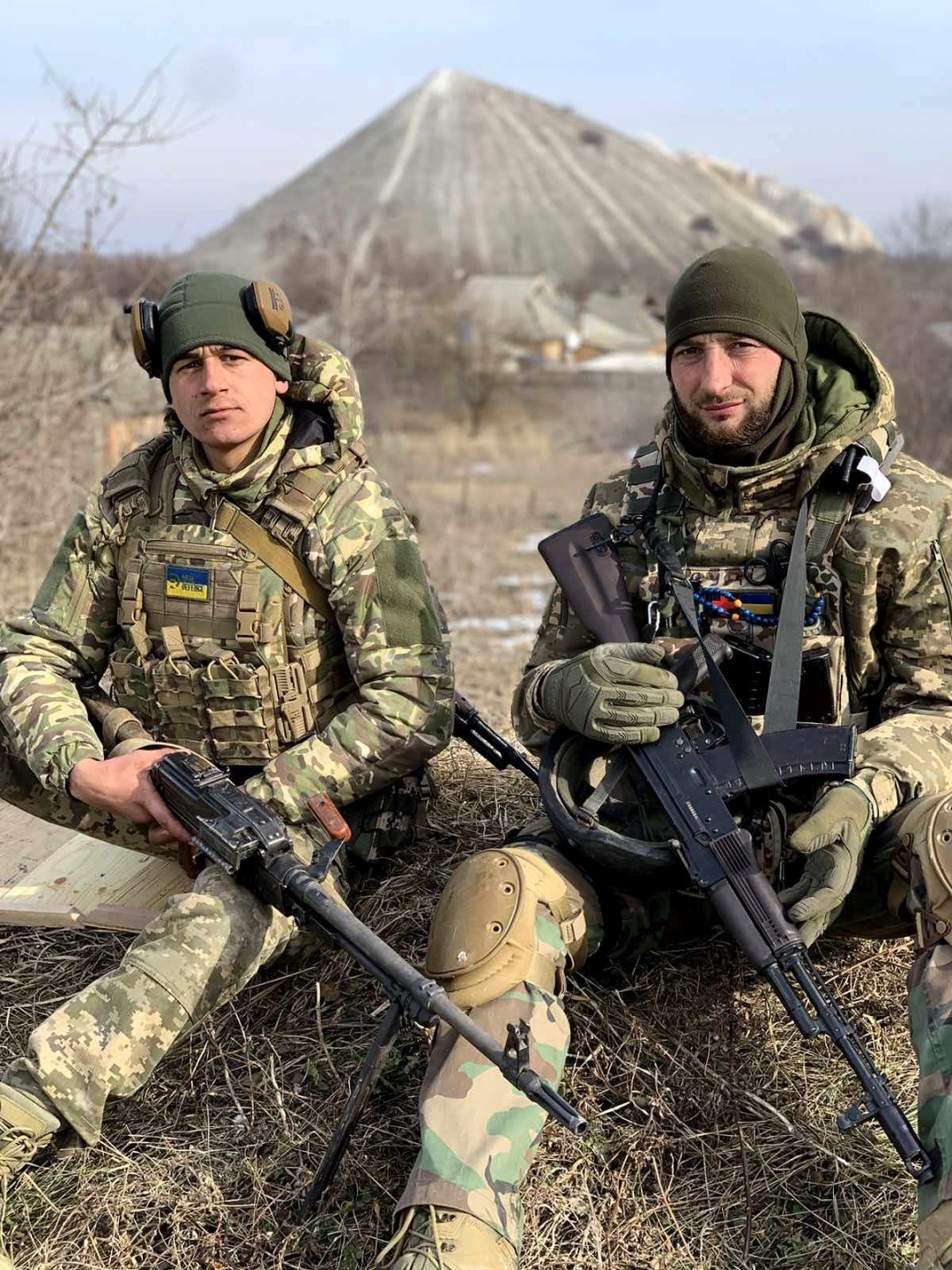
BEFORE HE DIED, HE COVERED HIS FELLOW SOLDIER WITH HIS BODY
"I remember that before they left for the front, they were confessed by a priest. Vadym had a Ukrainian flag and two crosses with him, his and mine, so that my guardian angel would protect him. He already knew what he would do there, whom he would teach. He thought he would come home with a victory, but he was brought back," Olena continues her story.
Vadym Kutovyi, deputy commander of a combat vehicle of the 109th Battalion, went to the front in January 2023 as part of the 10th Mountain Assault Brigade. He died in Bakhmut on March 9, saving his comrade on the battlefield.
"...at about 5 p.m. Vadym went to his position for the last time. Before reaching the village, he radioed that the area was mined. He received an order to go back with the group. The enemy spotted the group's movement from a drone, and mortar fire began. The mine hit the trench where the guys were at the time. Vadym received a fatal shrapnel wound right in the heart. Before he died, he managed to shield his fellow soldier Valentyn Nesterov. He was almost 10 years older than Vadym. Three soldiers were killed that day. Valentyn survived, but was wounded. Two days later, he returned to the position to pick up the bodies of the dead, but he also died in the same place," says Olena.
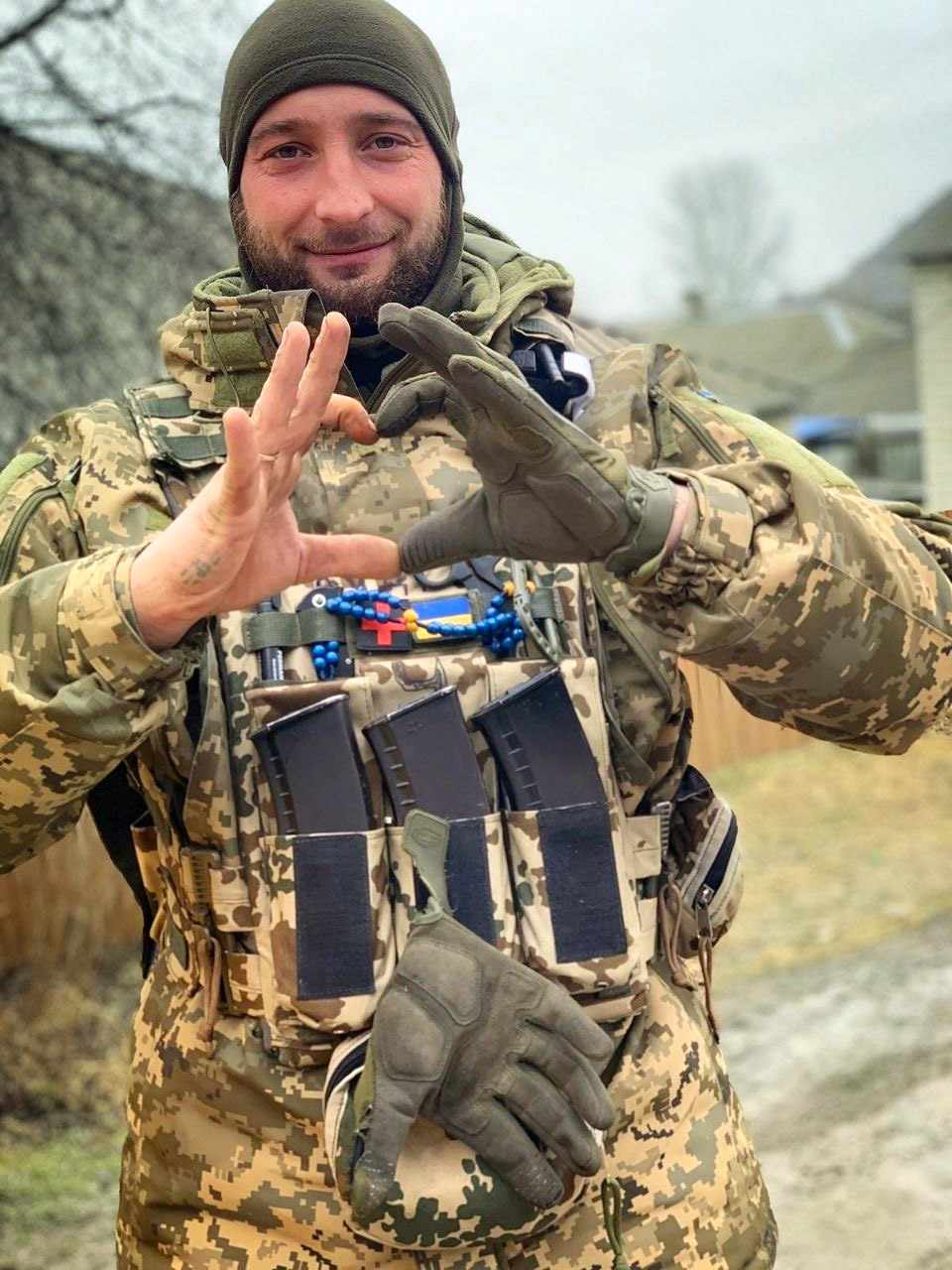
I WANT TO HUG YOU IN MY ARMS
Vadym was two weeks shy of his 30th birthday. In his last conversation with Olena, he asked her not to send any gifts to the front. And then he suddenly added: "And never forget me."
"I've been to Bakhmut, I understand what's going on there, because I went there as a volunteer. But I don't understand how he could have died. This man went through Ilovaisk. I saw how he fought, how he was able to find a shelter where I would never have found it, would not have thought of it, would not have reacted. He had an instant reaction. I had talked to him the night before. Then my dad talked to him. He asked, "How?" and then told Vadym, "Pray," and I understood everything," Olena recounts her feelings.
Vadym Kutovyi was posthumously awarded the Medal "For Honor and Victory" and the Order "For Courage" of the III degree. The hero was buried on the Walk of Fame near Ivano-Frankivsk, in the village of Chukalivka. Before the burial, Olena washed her beloved's body in the church, changed his clothes, and put his last letter in the coffin.
"I want to hug you. Just for a moment. Just one short moment. And then, after that. Nothing more is needed. It hurts... Why does it hurt so much?" Olena wrote in it.
Vadym Kutovyi is survived by his daughters Olha, Oleksandra, and the youngest, Anastasiia. She was also told about her father's death immediately.
"When Nastia heard about it, she scattered all her toys and still doesn't play. She says she is waiting for her dad," explains Olena.
After the death of her beloved, Olena got a tattoo on her arm - three hearts symbolizing her three daughters and the inscription "Together to the end". Vadym wrote these words to her when he sent her his last photo. In it, he showed her his heart and added that he loved her very much.
"Vadym is my soul. It was as if we both died that day," Olena admits.
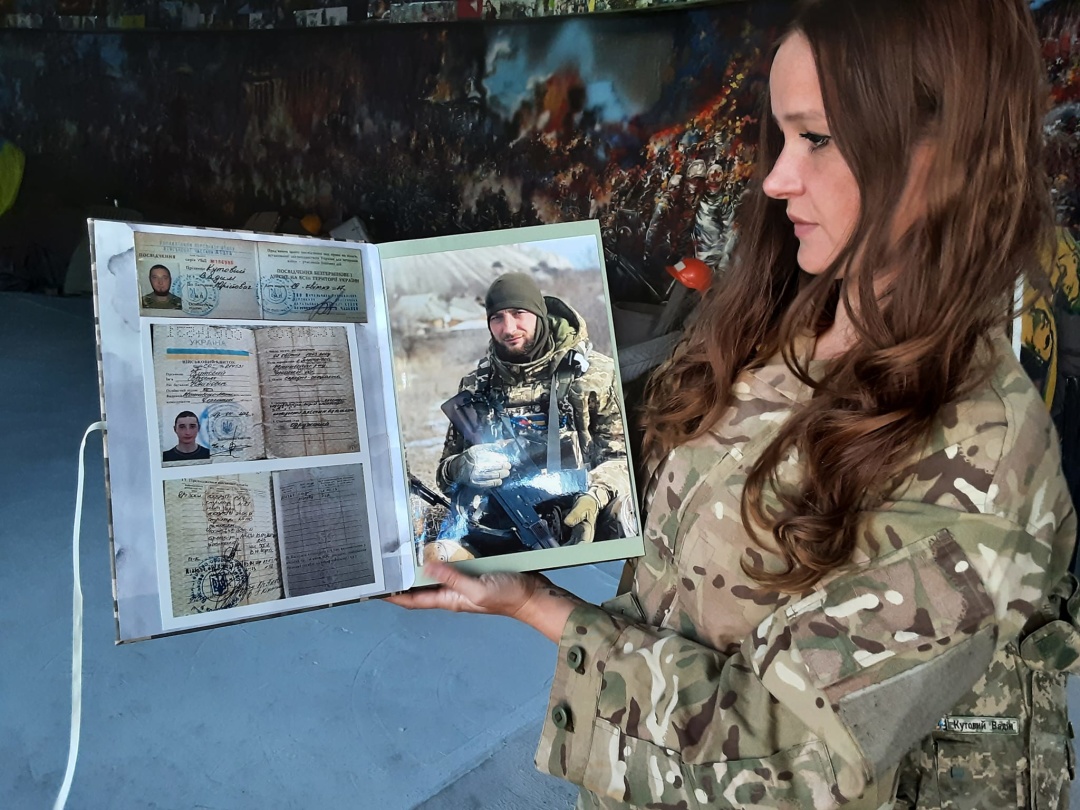
Olena donated the worn jacket Vadym wore while serving in the Donbas battalion with the call sign "Woody," army pants, a sweater he loved to wear, a photo album, a book she published for him, and other items to the Heavenly Hundred Museum in Ivano-Frankivsk. When asked what prompted her to make this decision, Olena says simply: "He deserves to be remembered."
"I want to go back to service... I think if I die, these things should be left for future generations, and in this museum people will be able to remember Vadym, as well as everyone who has been fighting for a free Ukraine since the Maidan. About all those who resisted the enemy to the end, even when they really wanted to live."
Iryna Druzhuk, Ivano-Frankivsk

